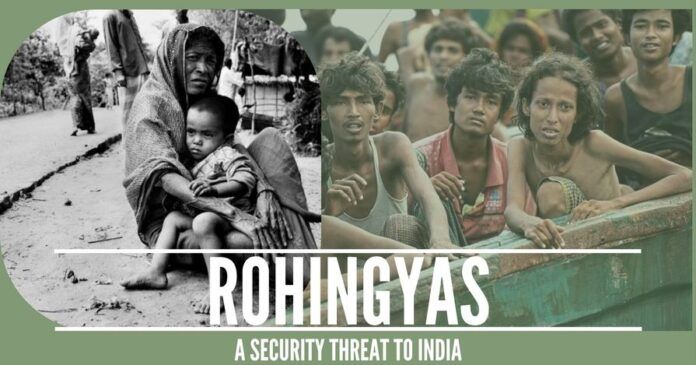
The stand taken by the Union Government on the Rohingyas issue in the SC is both national and rational
Finally, it has happened, to the happiness of the nation. The Ministry of Home Affairs (MHA) on Sept 18 filed a 15-page affidavit on the issue. The issue had vertically divided the nation. Islamists, Congress, Leftists and half-Leftists had been opposing the Union Government’s reported move to deport Rohingyas and the nation as a whole had been demanding their immediate expulsion on the ground that they posed a live threat to national security and the country’s demographic balance, particularly in the communally-sensitive and strategic border states like Jammu & Kashmir, the North-Eastern States and West Bengal.
Notwithstanding the fact that the MHA told the apex court that it would submit another detailed affidavit on October 3, when the case will again come up for hearing, the September 18 affidavit made it absolutely clear that the Rohingyas will have to quit India and that it is the prerogative of the executive, and not of the judiciary, to take a final call on the issue.
“Let executive decide on deportation of Rohingyas,” MHA told the Supreme Court (Indian Express, Sep 18). “The plan to deport Rohingya refugees is a policy decision and the court should desist from interfering in the matter,” the Union Government told the Supreme Court (Hindustan Times, Sep 18).
“The Centre has intelligence inputs of links between some Rohingya Muslims and Pakistan’s ISI and global terrorist outfit the Islamic State (IS).
What the MHA said about the need to prefer an executive route over the judicial route to settle the issue was significant. However, what was all the more significant was its assessment on the Rohingyas and implications of their stay in India for the national security and the country’s demography.
The affidavit, inter-alia, said: “The Centre has intelligence inputs of links between some Rohingya Muslims and Pakistan’s (spy agency) Inter-Service Intelligence (ISI) and (global terrorist outfit) the Islamic State (IS), making them (Rohingyas) a serious security threat to the country. Militants among the Rohingyas are active in Delhi, Hyderabad, Mewar and Jammu…There is an ‘organised’ network of touts operating in Myanmar, West Bengal and Tripura to facilitate the influx of illegal Rohingya’ refugees to India (to achieve an ‘ulterior motive’). Many Rohingyas have ‘illegally’ got voter identity cards and PAN cards, and some are ‘using hawala’ route to raise money for illegal activities. The right to residence is available to citizens and not illegal migrants like the Rohingyas,” (Times of India, Sep 18; Republic TV).
While arguing for deporting the Rohingya Muslims, the MHA claimed in its affidavit that the “organised Rohingya Muslim influx started in 2012” and that “there are around 40,000 such refugees in the country currently”. But more than that, it said that the “presence of illegal Rohingya Muslims in India is not only a drain on India’s resources but also a serious security threat to India” (Times of India, Sep 18).
“India has not signed any international treaty on refugees and is not under any obligation to keep the Rohingyas” (Hindustan Times, Sept 18)
“The fundamental rights of Indians will be seriously violated if Rohingya refugees are allowed to stay in the country and deprive Indians of their legitimate share. This would lead to social unrest in India,” the affidavit further said (Hindustan Times, Sept 18).
According to the Republic TV report, the affidavit said that “there could be attacks on Buddhists in India” and that “their presence in India will cause a ‘serious change’ in the Indian demographic profile”.
Another very significant point which the MHA made before the apex court through its affidavit was that “India has not signed any international treaty on refugees and is not under any obligation to keep the Rohingyas” (Hindustan Times, Sept 18).
It is a fact that India has neither signed the 1951 United Nations Refugee Convention nor its Protocol, which requires countries to accept refugees.
Earlier, in the morning, Minister of State for Home, Kiren Rijiju, had hinted at the stand the ministry could take in the Supreme Court through an affidavit and also had taken on human rights groups. He had said: “The Rohingya issue is a sensitive matter. Whatever Government of India will do, will be in the nation’s interest. Our way forward will be based on the nation’s interest and we’ll mention the same in our affidavit to be submitted to the Supreme Court…I request international human rights bodies’ to not spread misinformation about India and the Indian Government; protecting the nation is our duty” (Indian Express, Sep 18).
“Just because the Rohingyas are Muslims, the Union Government is communalising the issue,” – Prashant Bhushan
The MHA filed the affidavit in response to the application filed by two Rohingya immigrants, Mohammad Salimullah and Mohammad Shagir. A number of senior advocates defended the Rohingya cause. Some of them were Fali Nariman, Kapil Sibal, Rajeev Dhawan, Colin Gonsalves, Ashwini Kumar and Prashant Bhushan (Times of India, Sep 18).
The composition of the advocates who appeared for the Rohingya Muslims speaks for itself. It is hardly necessary to comment on the credentials and political affiliations of some of them as well as their ideology. All the concerned Indian citizens are fully aware of everything. Suffice to say that they are all top lawyers and only the rich people can engage them.
The stand taken by the Union Government on the Rohingya issue in the Supreme Court is both national and rational and it is based on the inputs provided by the concerned agencies. To question their assessment would be only to undermine the intelligence machinery, vital for the country, and play into the hands of the forces inimical to India’s sovereign interests and demographic balance.
The stand of the Narendra Modi Government is consistent with the national sentiment and against those who do not ask the 57 Muslim nations and European countries to accept them and want India to accept them on the ground that the “Rohingyas are a human issue” or those who say that the Union Government is opposing the Rohingyas just because they are Muslims. One case in point is Prashant Bhushan, who after the submission of the affidavit by the Union Government made one such unwarranted comment. “Just because the Rohingyas are Muslims, the Union Government is communalizing the issue,” he said in response to a media query in the Supreme Court.
Note:
1. The views expressed here are those of the author and do not necessarily represent or reflect the views of PGurus.
- ‘Kashmir My core constituency’: Revisiting July 12, 2003 to understand politics, Omar Abdullah-style - March 15, 2024
- Total deviation from traditional approach: Seven takeaways from PM Modi’s March 7 Srinagar visit - March 9, 2024
- Status of political parties: Why is further J&K reorganization imperative? - March 1, 2024










